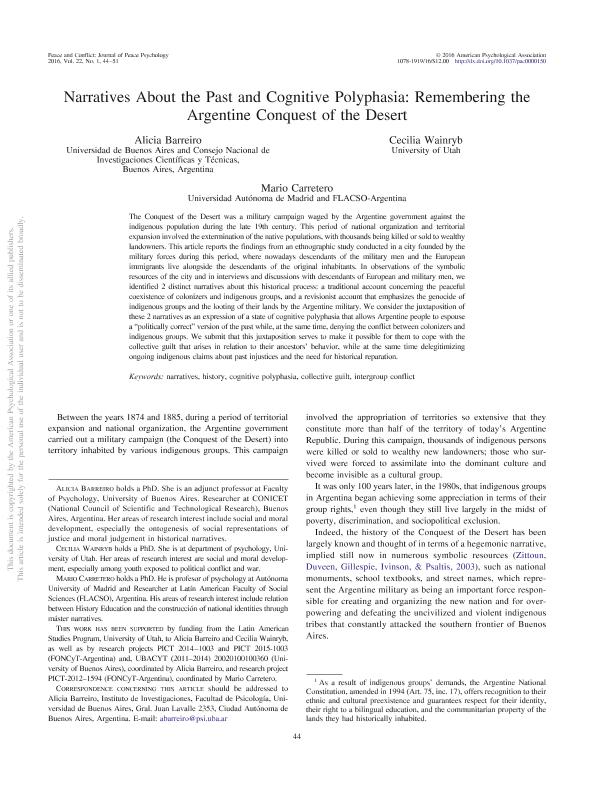Mostrar el registro sencillo del ítem
dc.contributor.author
Barreiro, Alicia Viviana

dc.contributor.author
Wainryb, Cecilia
dc.contributor.author
Carretero, Mario
dc.date.available
2017-06-05T15:37:41Z
dc.date.issued
2016-02
dc.identifier.citation
Barreiro, Alicia Viviana; Wainryb, Cecilia; Carretero, Mario; Narratives about the past and cognitive polyphasia: Remembering the argentine conquest of the desert; American Psychological Association; Peace and Conflict; 22; 1; 2-2016; 44-51
dc.identifier.issn
1078-1919
dc.identifier.uri
http://hdl.handle.net/11336/17472
dc.description.abstract
The Conquest of the Desert was a military campaign waged by the Argentine government against the indigenous population during the late 19th century. This period of national organization and territorial expansion involved the extermination of the native populations, with thousands being killed or sold to wealthy landowners. This article reports the findings from an ethnographic study conducted in a city founded by the military forces during this period, where nowadays descendants of the military men and the European immigrants live alongside the descendants of the original inhabitants. In observations of the symbolic resources of the city and in interviews and discussions with descendants of European and military men, we identified 2 distinct narratives about this historical process: a traditional account concerning the peaceful coexistence of colonizers and indigenous groups, and a revisionist account that emphasizes the genocide of indigenous groups and the looting of their lands by the Argentine military. We consider the juxtaposition of these 2 narratives as an expression of a state of cognitive polyphasia that allows Argentine people to espouse a "politically correct" version of the past while, at the same time, denying the conflict between colonizers and indigenous groups. We submit that this juxtaposition serves to make it possible for them to cope with the collective guilt that arises in relation to their ancestors´ behavior, while at the same time delegitimizing ongoing indigenous claims about past injustices and the need for historical reparation.
dc.format
application/pdf
dc.language.iso
eng
dc.publisher
American Psychological Association

dc.rights
info:eu-repo/semantics/openAccess
dc.rights.uri
https://creativecommons.org/licenses/by-nc-sa/2.5/ar/
dc.subject
Cognitive Polyphasia
dc.subject
Collective Guilt
dc.subject
History
dc.subject
Intergroup Conflict
dc.subject
Narratives
dc.subject.classification
Otras Psicología

dc.subject.classification
Psicología

dc.subject.classification
CIENCIAS SOCIALES

dc.title
Narratives about the past and cognitive polyphasia: Remembering the argentine conquest of the desert
dc.type
info:eu-repo/semantics/article
dc.type
info:ar-repo/semantics/artículo
dc.type
info:eu-repo/semantics/publishedVersion
dc.date.updated
2017-06-05T14:48:15Z
dc.journal.volume
22
dc.journal.number
1
dc.journal.pagination
44-51
dc.journal.pais
Estados Unidos

dc.description.fil
Fil: Barreiro, Alicia Viviana. Consejo Nacional de Investigaciones Científicas y Técnicas; Argentina. Universidad de Buenos Aires; Argentina
dc.description.fil
Fil: Wainryb, Cecilia. University Of Utah; Estados Unidos
dc.description.fil
Fil: Carretero, Mario. Universidad Autónoma de Madrid; España. Facultad Latinoamericana de Ciencias Sociales; Argentina
dc.journal.title
Peace and Conflict
dc.relation.alternativeid
info:eu-repo/semantics/altIdentifier/url/http://dx.doi.org/10.1037/pac0000150
dc.relation.alternativeid
info:eu-repo/semantics/altIdentifier/url/http://psycnet.apa.org/?&fa=main.doiLanding&doi=10.1037/pac0000150
Archivos asociados
